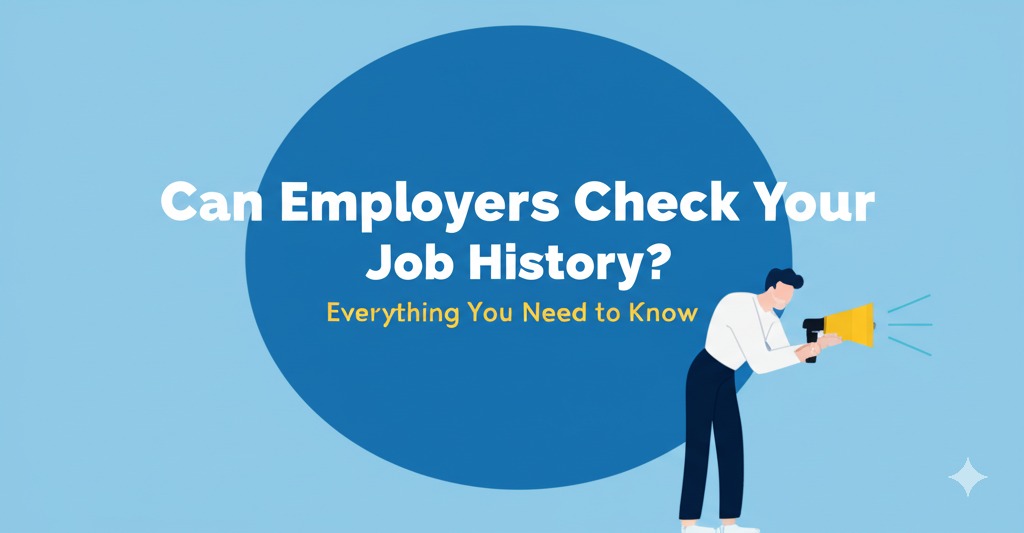
In today’s competitive job market, honesty and transparency are more important than ever. But many job seekers still wonder: can employers check your job history? Whether you’re polishing up your resume or preparing for your next interview, it’s essential to understand what employers can (and can’t) verify about your past employment.
This article explores how employers check job history, why they do it, what kind of information they can access, and how you can prepare to ensure your background won’t raise any red flags.
Why Employers Verify Job History
Employers aren’t just being nosy – verifying job history helps them:
- Ensure honesty and accuracy on resumes and applications.
- Confirm experience and qualifications for the role.
- Avoid negligent hiring lawsuits by verifying employment claims.
- Gauge a candidate’s stability and work ethic.
Hiring someone based on false information can cost a company time, money, and reputation. That’s why employment verification is a standard part of most hiring processes.
How Do Employers Check Your Job History?
1. Contacting Previous Employers
The most straightforward method is contacting your past employers directly. HR departments or managers may confirm:
- Job title
- Dates of employment
- Reason for leaving
- Eligibility for rehire
Note: Many companies have strict policies and may only confirm basic facts due to liability concerns.
2. Background Check Services
Employers often use third-party background check companies to verify employment. These services compile data from:
- Public records
- Credit reports (with permission)
- Past employer databases
These checks typically require your written consent, especially if conducted after a conditional job offer.
3. Reviewing Your Resume and Social Media
Recruiters might also compare your resume to your LinkedIn profile or other online presence. Any inconsistencies can raise red flags.
Pro tip: Keep your resume and LinkedIn profile aligned to avoid misunderstandings.
What Information Can Employers Legally Access?
Employment verification laws vary by location, but generally, employers can legally check:
- Job titles and duties
- Dates of employment
- Salary history (in some states, this is restricted)
- Performance reviews or reasons for leaving (only if the previous employer discloses them)
Privacy and Consent
Under the Fair Credit Reporting Act (FCRA) in the U.S., employers must:
- Obtain your written permission before conducting a background check.
- Notify you if the information leads to a negative employment decision.
International laws vary, so always check your local regulations if you’re job hunting abroad.
What If You Lied on Your Resume?
Falsifying job history can have serious consequences:
- Job offers may be rescinded.
- You could be fired even after you’ve started the job.
- It damages your professional reputation.
Instead of fabricating experience, focus on:
- Highlighting transferable skills.
- Emphasizing growth and learning from previous roles.
- Being honest about employment gaps with valid explanations.
How to Prepare for Employment Verification
1. Keep Your Records Accurate
Maintain a list of:
- Past employers
- Job titles and responsibilities
- Dates of employment
2. Inform Your References
Let your references know they might be contacted. Make sure they can speak positively about your time with them.
3. Be Transparent During the Hiring Process
If you anticipate any issues (e.g., a short stint or negative departure), address it early in the interview process. Honesty builds trust.
Conclusion: Honesty Is the Best Policy
So, can employers check your job history? Absolutely. While the extent of the check may vary, most companies will verify at least the basics. To stay ahead in your job search:
- Be truthful on your resume.
- Stay prepared for employment verification.
- Clarify any potential red flags proactively.
Remember, the goal is to build a long-term professional relationship. Starting it on a foundation of honesty is the best way to succeed.
Need help polishing your resume or preparing for interviews? Check out our career resources or connect with a career coach today!

Andre Cuevas provides career insights, job search strategies, and professional advice to help individuals navigate the job market and achieve their career goals.





